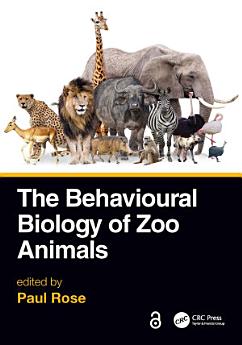The Behavioural Biology of Zoo Animals
About this ebook
The book enables all aspects of zoo husbandry and management (nutrition, enclosure design, handling and training, enrichment, population management) to be based on a sound knowledge of the species, its evolutionary history and its natural history. Chapters from expert authors cover a vast range of taxa, from primates and elephants to marine mammals and freshwater fish, to reptiles, birds and invertebrates. A final part looks to the future, considering animal health and wellbeing, the visitor experience and future visions for zoos and aquariums.
For on-the-ground practitioners as well as students of zoo biology, animal science and welfare, this book provides an explanation of key areas of behavioural biology that are important to fulfilling the aims of the modern zoo (conservation, education, research and recreation). It explains how evidence from the wild can be implemented into captive care to support the wider aims of the zoo, shedding light on the evidence-based approaches applied to zoo biology and animal management.
Chapter 3 is available to download Open Access on the www.taylorfrancis.com website under a Creative Commons Attribution-Non Commercial-No Derivatives 4.0 license.
Aa Companion Website with additional resources is freely available for all at www.bbzabook.wordpress.com and you can follow the book on Instagram at @bbza_book.
Ratings and reviews
About the author
Dr Paul Rose gained his PhD in 2018, investigating the behaviour and welfare of captive flamingos using a variety of methodological approaching including social networks analysis. He is a lecturer in the Psychology Department at the University of Exeter where he specialises in animal behaviour. Paul also works for the Wildfowl & Wetlands Trust (WWT) where he manages the Animal Welfare & Ethics Committee and is a research associate for WWT’s captive animal research programme. Paul is also a lecturer on the zoo animal management courses for University Centre Sparsholt. As a member of Defra’s Zoos Expert Committee, Paul writes and reviews policy pertaining to the running and licencing of zoos and aquariums. Paul is also co-chair of the IUCN Flamingo Specialist Group and is a member of the IUCN SSC Giraffe & Okapi Specialist Group. He is the co-chair of the BIAZA Research Committee and a member of the BIAZA Bird Working Group steering committee. Paul completed his first piece of in-zoo research in 2002 and has been professionally involved in zoo animal behaviour and welfare in an academic and practitioner capacity since 2006. His research predominantly focusses on behaviour and welfare, and evidence for zoo husbandry. He is a Senior Fellow of the Higher Education Academy and a Fellow of the Zoological Society of London.





